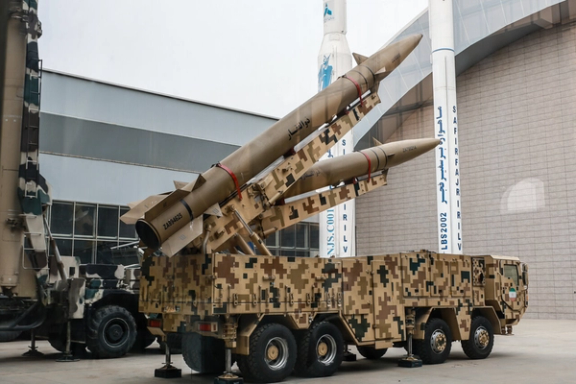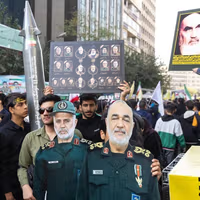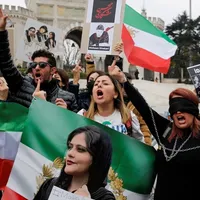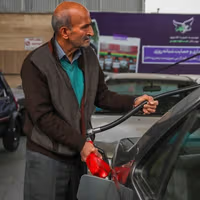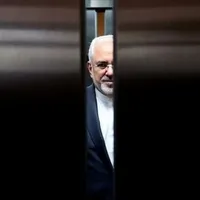Greenhouse Gas Polluter Iran Warms At Twice Global Rate
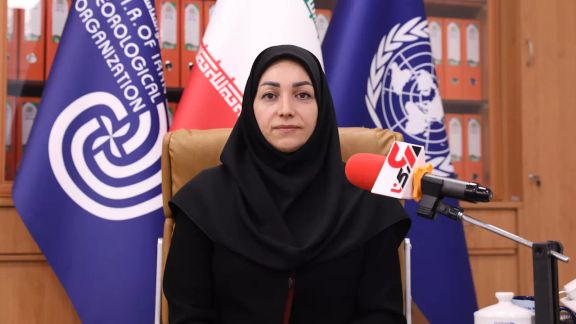
Temperatures are rising at double the average global rate in Iran – one of the world’s top emitters of greenhouse gases.

Temperatures are rising at double the average global rate in Iran – one of the world’s top emitters of greenhouse gases.
The head of Iran’s Meteorological Organization, Sahar Tajbakhsh, revealed the alarming increase on Saturday, adding that rainfall has taken a worrying decline.
Speaking to ISNA, she attributed the higher-than-average climate change to Iran’s geography, such that its north and south are located in mid-latitudes and sub-tropical latitudes respectively.
She said: “The country's annual rainfall patterns have shown a decreasing trend in the last five decades.”
Looking back over the past 30 years, she observed: “This trend has unfortunately led to irreparable environmental and economic-social consequences.”
According to research published by The Lancet journal in April, currently, the number of “deaths due to global warming in the Middle East is 2·1 per 100,000 people”. However, the region “will have experienced substantial warming by the 2060s with the potential to reach the annual heat-related deaths to 123·4 per 100,000 people”.
In Iran’s case, this number is currently 11 deaths per 100,000 people, which is five times the average of the Middle East, but it will reach 423 in the next four decades.
According to the report, the Middle East is one of the most vulnerable parts of the world to global warming and climate change.
The report stated that the number of annual deaths due to global warming in Iran is around 1,703 people meaning six times more than that of Saudi Arabia.
The most important cause of global warming is the emission of greenhouse gases. International statistics, including those of the International Energy Agency and the Global Carbon Project, show that Iran has the highest emission of greenhouse gases in the Middle East and is ranked sixth globally. The situation is unlikely to change with the Islamic Republic mired in economic crisis and failing to invest in renewable energy.
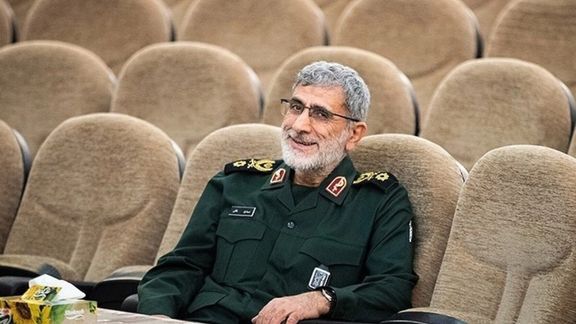
Commander of Iran’s extra-territorial Quds Force, Esmail Qaani praised “Islamic resistance” forces and vowed to support “Palestinian heroes” in a speech on Friday.
Qaani took credit that Palestinian militants are conducting “30 operations daily” against Israel and emphasized that “This is the result of the resistance front and global Islamic mobilization.”
‘Resistance’ front is the Iranian regime’s jargon referring to its regional allies, such as Syria, and militant groups being financed and supported by Tehran, such as the Lebanese Hezbollah and Palestinian groups Hamas and Islamic Jihad.
Large-scale Palestinian attacks against Israel took place in early April, as Iranian officials triumphantly claimed that the end of the Jewish state was near. After a lull fighting resumed earlier this week when Israel killed several Islamic Jihad leaders in a targeted air strike. Although Hamas, the largest Palestinian group did not enter the fighting this time, Islamic Jihad has fired hundreds of rockets and Israel has continued air strikes at the group.
Last week, Qaani claimed that Iran has humiliated Israel by organizing the “Islamic resistance” and said, At this point, Israel has reached a level of humiliation that it has surrounded itself with barbed wire and radars to prevent infiltration.”
But in his Friday speech in the religious city of Mashhad Qaani went farther and said that Iran has organized “a global network of resistance,” to defend Muslims and their honor.
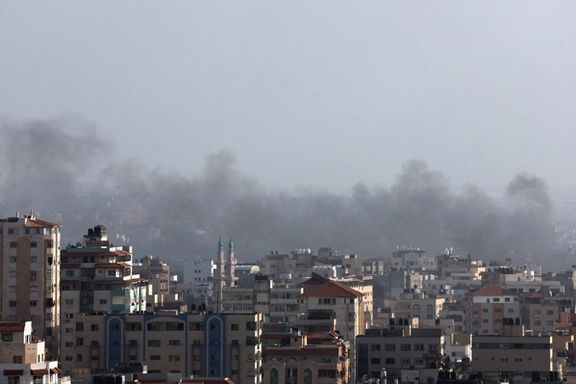
The Iranian regime as a Shiite Muslim political force has limited appeal with Sunni Muslims and its reach is mainly among Shiites in Middle Eastern countries, such as Iraq and Lebanon. However, it directs billions of dollars a year to finance an array of militia forces and their political networks. For example, it has spent at least $50 billion to support Bashar al-Assad’s regime in Syria during 12 years of civil war.
Qaani’s speech was on the 10thanniversary of the Fatemiyoun Brigade, an Afghan force that Iran organized in 2013 to fight in Syria. Unconfirmed reports indicate that more than 2,000 Afghans were killed during battles in Syria in 2010s.
The Quds commander lavishly praised the founder of the Fatemiyoun, Alireza Tavassoli, known as Abu Hamed, who was killed near Deraa in Syria in February 2015 in a battle with Assad’s opponents. He was a close associate of Qassem Soleimani, the former Quds commander who was killed in a targeted US air strike in Baghdad in January 2020.
Abu Hamed, who was a Shiite Muslim, was born in Afghanistan in 1962 and fought against the Soviets but fled and settled in Iran in the mid-1980s, where he received religious education and then was recruited to establish the Fatemiyoun Brigade.
“The resistance front has grown from a seed and a young plant into an extensive axis that connects the various points of the resistance forces across the world,” Qaani said, praising what his predecessor Soleimani spent nearly 20 years organizing.
He went on to say that Iran’s revolutionary government in the 1980s and later Supreme Leader Ali Khamenei played the main role in launching the “resistance front,” that today even enemies admit decides the outcome of battles. He claimed that because of Iran’s leadership, the Hezbollah in Lebanon and Houthis in Yemen are ready to help the Palestinians.
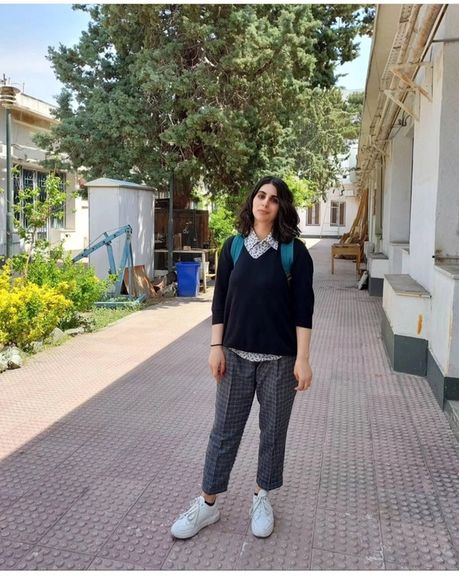
A woman who was arrested and tortured for protesting against hijab rules in Iran has been punished by her university with two semesters suspension.
Sepideh Rashno, 28 has been suspended from Alzahra University in Tehran due to "non-observance of the Islamic hijab", she revealed on her Instagram account on Saturday.
She had been told to "go on leave for two semesters" but refused and so was suspended.
"As a citizen, I have the right to choose the clothes I wear,” she wrote in response to the decision, adding that she plans to return to the university after her suspension with “her preferred outfit.”
The artist and writer was arrested in July after a heated dispute with a hijab enforcer on a city bus. A video of the clash she posted on social media went viral.
She was tortured into a confession and condemning other activists, and also forced to express her regret both for the confrontation with the hijab enforcer and for posting the video.
Rashno was found guilty of “association and collusion with the intention of committing a crime against the country's security through communication with foreigners and propaganda activity against the Islamic Republic and encouraging people to commit corruption and prostitution" and “propaganda against the Islamic Republic” and given a five-year suspended jail sentence in December.
Her courageous stance follows the death of Mahsa Amini, 22 in September last year while in custody for breaching hijab rules. Her killing sparked nationwide protests which are still ongoing.
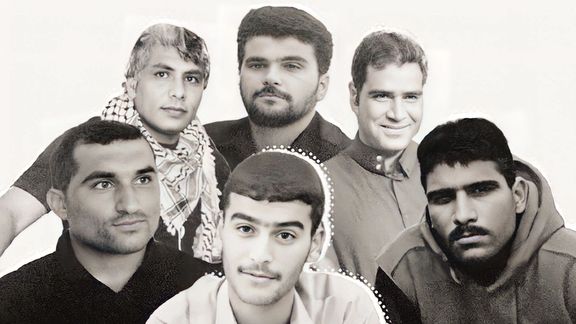
Amnesty International has urged Iran to drop the imminent execution of six ethnic Arab men and three other prisoners whose gave “tortured-tainted” confessions.
The international rights body said the prisoners arrested in the oil-rich Khuzestan province had been denied their right to a fair trial and their detention is “arbitrary”.
The execution of Adnan Ghobeishavi, 25, Moein Khanfari, 28, Mohammad Reza Moghaddam, 29, Salem Mousavi, 39, Habib Deris, 42, and Ali Majdam, 43 could take place at any time after a Supreme Court ruling on March 6 upheld the sentences against them.
In a separate tweet Amnesty International also voiced concern over the fate of three other detainees in Esfahan.
“Majid Kazemi, Saleh Mirhashemi and Saeed Yaghoubi are at imminent risk of execution at central Esfahan prison (also known as Dastgerd prison) after Iran’s Supreme Court upheld their unjust convictions and death sentences in early May 2023.”
After nationwide anti-government protests last year, which is still not fully contained, the Iranian regime has embarked on a wave of executions that has seen dozens hanged this year. Activists are concerned that the executions aim to intimidate the population from further protests.

The regime used overwhelming force and military weapons to kill more than 500 civilians during the protests. Hundreds of others received permanent bodily injuries, including loss of eyes because of shotgun pellets fired at the faces of protesters. More than 20,000 were arrested.
The London-based human rights watchdog said on May 12 that the six should have access to their families, lawyers and adequate medical care pending their release.
“Their group trial was grossly unfair. The men were denied lawyers of their own choosing and were never allowed access to their court-appointed lawyer, even at trial. The authorities have barred them and their lawyer from accessing their casefile and verdict,” Amnesty said.
According to the report, the men's "torture-tainted" confessions were used by the Revolutionary Court in Ahvaz to sentence them to death on February 14 on the charge of "waging war against God" following the armed operations conducted by a separatist group in which members of the security forces were killed.
Amnesty said that the men, who have denied the charges, were neither allowed lawyers of their own choosing nor access to their court-appointed lawyers during trial, and that the authorities prevented them from seeing their case files and verdicts.
IRGC agents subjected one of the detainees to "sleep deprivation, waterboarding, electric shocks, beatings, and hanging upside down while submerging his head in water," according to the group.
Amnesty expressed concern that three other Iranian men are at imminent risk of execution in Isfahan after the Supreme Court affirmed their "unjust" convictions earlier this month.
Since late April, at least 60 people have been executed across the country for charges that under international law should not result in the death penalty, according to the New York-based Human Rights Watch (HRW).
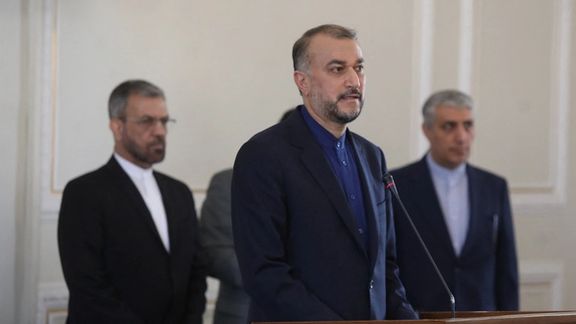
Tehran’s foreign minister has welcomed the warming relations between Iran and Saudi Arabia following their unexpected deal in March to resume relations.
Foreign minister Hossein Amir-Abdollahian expressed satisfaction over the introduction of ambassadors in a phone call on Friday reported by Iranian local media.
The joint agreement between predominantly Shia Iran and Sunni Saudi Arabia brokered by Beijing sent shock waves through the region when it was revealed earlier this year after long-standing rivalry between the two states.
"The Islamic Republic has taken the necessary measures for the official opening of its embassy in Saudi Arabia," said Amir-Abdollahian.
Iran's foreign minister added that "the plans to visit the respective capitals by the foreign ministers is a sign of determination of the parties to cooperate and renew relations."
Iranian media reported that the Saudi Foreign Minister bin Farhan expressed satisfaction over the developments in line with the Beijing agreement.
In the agreement to restore relations between Tehran and Riyadh, which was inked in March with the mediation of China in Beijing after eight years of tensions between the two archrivals, it was stated that the embassies and consulates will be reopened within two months.
Upon the visit of Iran's Minister of Economy to Saudi Arabia, Riyadh on Friday introduced its new ambassador to Tehran.
Iran's Economy Minister Ehsan Khandouzi led an economic delegation to Jeddah on Thursday to hold bilateral meetings with Saudi officials and talks with the Islamic Development Bank during his stay.
He met with his Saudi counterpart, Mohammed Al-Jadaan on the sidelines of the meeting of the Islamic Development Bank.

The Group of Seven (G7) Finance Ministers and Central Banks' Governors warned about the risks posed by Iran in illicit financial activities.
The officials held a meeting in the Japanese city of Niigata on Saturday and issued a statement on pressing global economic and security issues.
"We are deeply concerned with illicit financing risk emanating from Iran," the Group stressed in their joint statement and pledged full support for the international watchdog, the Financial Action Task Force, FATF for monitoring global compliance.
FATF is a Paris-based inter-state organization following the observance of international financial rules against money laundering and financing of terrorism.
Iran and North Korea are both on FATF ‘blacklist’ for not adhering to several international financial conventions. The designation virtually cuts off the violators from the international banking system.
Iran has failed to pass legislation to comply with FATF demands and is recognized as a high-risk country for financial transactions and investments.
The Iranian regime wants to have a free hand in financing militant groups around the world, which would violate FATF’s anti-terror financing rules.
The Iranian banking system controlled by the government is opaque and mired in debt and corruption.
Even if the United States lifts its economic sanctions, Iran would still be considered a high-risk country if it does not comply with international financial rules.
The G7 officials meeting in Japan also strongly warned about North Korea and its “illicit activities” related to “Proliferation of weapons of mass destruction.”
